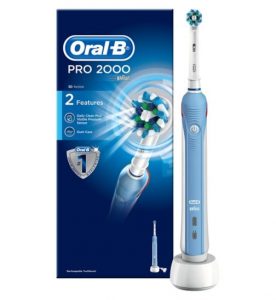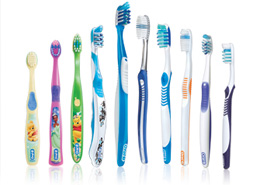23 / 05 / 2023
Manual V Electric – Which Is The Better Toothbrush?
A good oral hygiene regime is essential in the prevention of dental disease. Ensuring thorough removal of plaque bacteria helps reduce the likelihood of gum disease and dental decay. Here at Absolute we recommend brushing twice daily for a minimum of two minutes and using an interdental cleaning aid such as floss or tepe’s as part of your daily routine. I am asked daily by my patients whether they should be using a manual or an electric toothbrush, so here are some of the points to consider when making your decision.

- Electronic toothbrushes require less dexterity and technique than manual brushes, with many requiring the user to just hold the bristles on the tooth surface and let the toothbrush do the work. Many also have pressure sensors indicating to the user if they are brushing too hard and thus helping to prevent tooth surface loss and gum recession.
- Most good electronic toothbrush models have two minute timers helping to ensure users spend the minimum required brushing time.
- Todays electronic toothbrushes can range from more basic models to those with a variety of different features designed to encourage use and improve plaque control. These can include bluetooth connectivity linked to separate timer units or smart phone applications which provide information on your brushing technique.
- Electronic toothbrushes, however, can be expensive to purchase in comparison with a manual toothbrush with some of the newer models requiring a substantial financial outlay. They also require regular charging and can be heavy to hold.

- Manual toothbrushes are cheap, light to use and easy to transport. They are very effective at removing plaque bacteria, providing they are used correctly. Manual toothbrushes are very technique sensitive and the user must ensure they have the correct angulation and movement of bristles to achieve thorough plaque removal. Manual toothbrushes generally do not have timers forcing the user to estimate the length of time spent brushing and studies have shown that most people brush for less than a minute.
I would generally recommend using an electric toothbrush as studies have shown they do improve plaque control and subsequently reduce gingivitis. A Cochrane report published 2014 concluded that oscillating rotating type toothbrushes (Oral B type) reduce plaque bacteria by 11% in the first three months increasing to 21% after three months. It is however entirely a case of personal preference and there is no reason why excellent oral hygiene cannot be achieved when using a manual toothbrush if correct technique is used and time is taken.
For more advice on the type of toothbrush to use and effective toothbrushing techniques speak to one of our Hygienists who can discuss with you further and provide a demonstration.
GET IN TOUCH WITH US
- 3 Duke Street Court
- Bridge Street
- Kingsbridge
- TQ7 1HX











